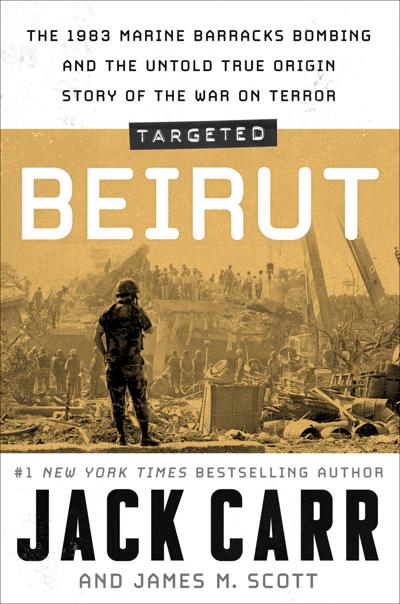
TARGETED: BEIRUT: The 1983 Marine Barracks Bombing and the Untold True Origin Story of the War on Terror. By Jack Carr and James M. Scott.
Atria/Emily Bestler Books. 464 pages. $30.

99. On Oct. 23, 1983, Ronald Reagan was on the golf course at Augusta National when a man rammed his truck through a fence and took seven people hostage in the pro shop, demanding to speak to the president.
The man eventually surrendered, and the whole incident was somewhat lost to history. This is largely because a few hours later, a man in Beirut rammed a truck through a fence and drove into the U.S.
Marine barracks. The driver detonated a massive bomb that killed 241 servicemen. WHAT: “Targeted: Beirut” book launch with authors Jack Carr and James M.
Scott WHEN: 6 p.m. Tuesday, Sept.
24 WHERE: Charleston Library Society, 164 King St. COST: Ticket prices, which include a book, range from $42-$52 MORE INFO: For more information, and to book, go to https://charlestonlibrarysociety.org/event/book-launch-exclusive-jack-carr-james-scott-and-survivors-of-beirut/ The tense lead-up, the attack itself, the recovery efforts and the aftermath are expertly described by thriller writer Jack Carr and Lowcountry-based military historian James M.
Scott in "Targeted: Beirut." It’s a masterful combination of thorough research and gripping drama. Lebanon in 1982 was such a quagmire that any present-day tensions in the region almost seem tame in comparison.
A feeble Christian-led government was surrounded by Palestinian Liberation Organization guerillas, Christian militias, and multiple Muslim militias, backed by Syria, who were in turn backed by the Soviets. Iranian Revolutionary Guards led terrorist training camps in the mountains, and Israeli forces were in Beirut, the south and the mountains. All in a country the size of Connecticut.
U.S. Marines first arrived in August of 1982, staying just long enough to facilitate the retreat of Yasser Arafat and PLO guerillas.
After the Marines left, things went from bad to worse. Lebanese president Bashir Gemayel was assassinated and Christian militiamen, under the guidance of Israel, massacred hundreds of Palestinian refugees. So Reagan sent the Marines back in.
What would happen over the next 13 months plays out like a textbook recipe for catastrophe. A poorly-defined mission. Infighting among desk-bound officials back home.
Eight hundred men entrenched at the low-lying Beirut airport, lugging a million sandbags that wouldn’t protect them. It would be impossible to blame one American for the tragedy, but Deputy National Security Advisor Robert McFarlane does not come off well in Carr's and Scott's telling. A Kissinger acolyte (and later Iran-Contra goat), he repeatedly pushed for a more aggressive stance.
Contrasting him is Col. Timothy Geraghty, the leader of Marine operations in Beirut. The proverbial “man in the arena,” Geraghty’s position reminded me of Maj.
Robert Anderson, the commander at Fort Sumter, another noble man caught in an impossible and indefensible position. The U.S.
forces were given the rather nebulous mission of “presence” (one reason the encampment at the airport wasn’t fortified like a base). The more Geraghty emphasized the importance of neutrality, the more it seems like a futile effort. Floating behind his troops was a fleet of U.
S. warships. McFarlane’s intended overall message, peace-through-strength, was likely lost in translation.
Today's Top Headlines Story continues below Invasive animals plague South Carolina. Here are the worst you've probably seen. Commentary: I'm tired of being called a book banner — and of our loss of common sense Why is liquor liability insurance causing South Carolina bars and restaurants to close? How a Beaufort family found a genie lamp in Spartanburg with wishes worth up to $1.
2M 'I got that ...
on video': SC man recovering after being bitten by world's most venomous snake Many North Charleston residents face food insecurity. Here's where to find free and fresh produce. Gamecocks' backup quarterbacks becoming topics this week Charleston could come close to 'major' flood stages several times this weekend.
Here's why. Indie horror movie filmed in Columbia uses Papa Jazz, New Brookland Tavern as settings Judge in Murdaugh-related case over leaked photos of Mallory Beach's body asked to step down A month before the bombing, the U.S.
finally was drawn into fighting, helping the Lebanese hold the pivotal mountain town of Suk al-Gharb. Geraghty knew then the Corps would “pay in blood for this decision.” His troops knew it, too.
The term “sitting ducks” comes up more than once. Poignant letters and tapes sent home are often fatalist: “I’ve never been so scared in all my life.” “You’ve been a good sister to me — be good to mom and dad.
” One Marine rushes to get married, another to get baptized. Another disavows violence: “My war hungry soul is quenched.” While McFarlane felt vindicated by the battle of Suk al-Gharb and the ceasefire that ensued, the truce allowed the various terrorist factions the time to reset and the freedom to explore for weak points.
They found the perfect target in the barracks, an abandoned office building only a few hundred feet from the airport. The building provided some safety from mortar rounds but not from “the poor man’s smart bomb.” (As one Hezbollah member said of the car bomb: “If Hezbollah had GPS-guided bombs dropped from 30,000 feet, they would not need martyrs.
”) The explosion, equivalent to 12,000 pounds of TNT, leveled the four-story building. FBI experts who inspected it afterward said it was the largest non-nuclear blast they’d ever seen. As Geraghty led rescue and recovery efforts, the war-hardened vet admitted the gruesome scene was threatening his “psychological balance.
” “ ‘Here lie the ...
unintended consequences’ he thought, ‘of getting sucked into an eight-sided civil war while trying to carry out a peacekeeping mission.’ ” Carr and Scott describe the backbiting and second-guessing that continued in the aftermath of the bombing. Lest we think our current crop of hotheaded congressmen and women are unique, one representative flies all the way to Beirut just to yell at Geraghty: “You’re going to eat a s***-sandwich!” Four days after the bombing, Reagan addressed the nation with a career-saving speech.
The now-trite mantra of “not letting the terrorists win” became a call to arms. Sign up for the Charleston Hot Sheet Get a weekly list of tips on pop-ups, last minute tickets and little-known experiences hand-selected by our newsroom in your inbox each Thursday. Email Sign Up!.













